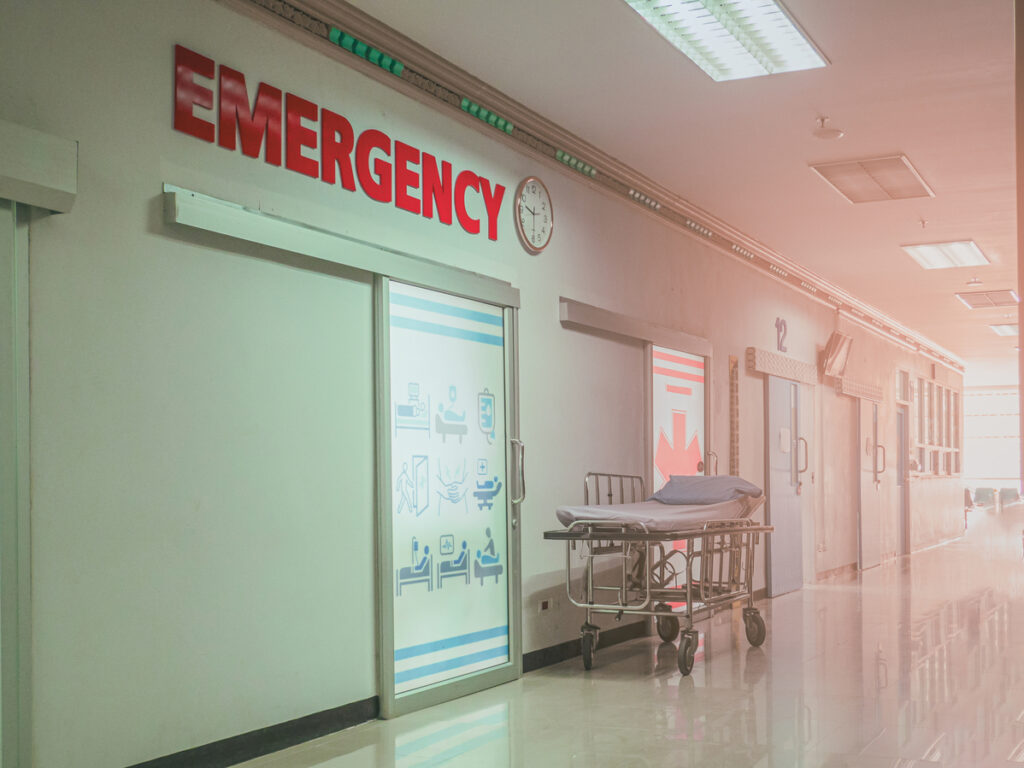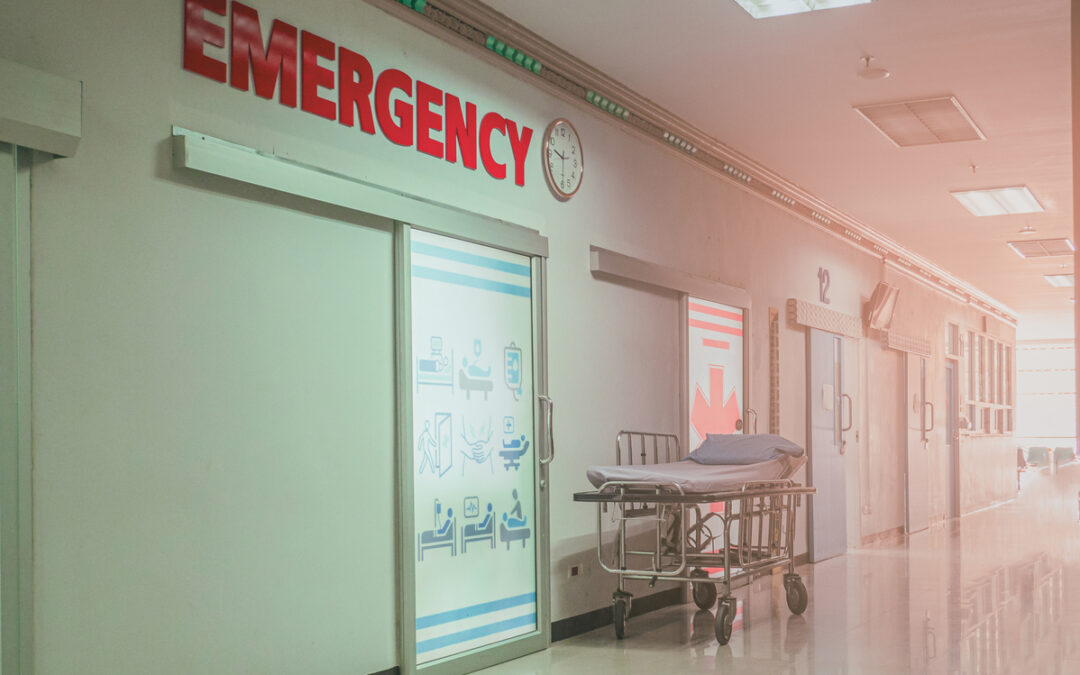No one plans for a sudden medical emergency, but having a medical plan in place when one strikes is imperative for everyone. While many medical emergencies might make it clear they require a swift visit to your nearest emergency room, other conditions may be harder to recognize as a cause for concern.
Jenkins County Medical Center is the trusted medical provider for Jenkins County and the surrounding counties. If you suspect you or your loved one is experiencing a medical emergency, our emergency department is open 24/7 to assist.
8 Signs You Need To Head To The Emergency Room
Severe Allergic Reaction

In the event you suspect you have come into contact with a known or suspected allergen and are beginning to feel the onset of symptoms such as shortness of breath, swelling of the face or nose, or excess vomiting, it is crucial that you (or your loved one) immediately bring yourself into a hospital emergency room.
Even if you employ the use of epinephrine, this provides only temporary relief and should be followed immediately by a visit to an emergency room.
High Fever
While fevers are one of the more common symptoms of many illnesses, they should not be underestimated. A fever that exceeds 103°F or lasts for days on end is cause for concern and might indicate that a visit to an urgent care center is needed for prompt fever relief. If a high fever pairs itself with further symptoms such as convulsions or an inability to retain consciousness, do not wait to seek medical assistance.
This is especially true in the case of infants who are at high risk in the event of a fever,
Rapid On-Set Inability to Speak (Aphasia), Walk, or Move
Slurred speech, difficulty walking, or sudden inability to move your body that has no clear prior cause could be the very first signs of a stroke or head injury. Without proper care, the patient may suffer lasting damage or even pass away. If you suspect your loved one is showing symptoms of a stroke, call 911 immediately or alert a triage nurse. Prompt medical care could be the only thing between your loved one and death.
Numbness Localized to One Side—Possible Stroke
Alongside aphasia, numbness located to one side of the body is a common symptom of a stroke. It may present as a sudden drooping of the phase or weakness localized to one side of the body. Also, an individual can experience problems with walking, severe dizziness, or a loss of balance or coordination.
However, this may also be a sign of further conditions such as multiple sclerosis or nerve damage. If you notice this in yourself or others, do not ignore it. With a stroke, acting “FAST” is key.
Remember:
- Facial Weakness: Can the person smile? Has their mouth or eye drooped?
- Arm Weakness: Can the person raise both arms?
- Speech Problems: Can the person speak clearly and understand what you say?
- Time to Call 911: If you notice any of these signs, call immediately.
Consumption of/Exposure to Poisonous or Toxic Material
If you have reason to suspect you have consumed potentially hazardous material or been exposed to toxic fumes, please contact poison control and immediately go to an emergency room. If possible, please note down the chemicals or hazardous material you consumed/were exposed to, as it’s important to ensure you are given proper care and not exposed to anything that might exacerbate the issue.
If a loved one has consumed or been exposed to poisonous substances and is incapacitated, please contact 911.
Intense Shortness of Breath
Shortness of breath paired with chest pains lasting longer than 15 minutes, wheezing, retractions, or a change of color around the lips or fingers indicates respiratory distress. This is a sign that the body is incapable of receiving enough oxygen. It may be caused by a blockage or any number of conditions and should not be left to pass on its own. CPR or first aid may be administered to stabilize the patient for transfer to a hospital.
Sudden Chest Pain or “Weight” On Your Chest—Possible Heart Attack
One of the most prominent signs of a heart attack is a sudden weight upon the chest. This can
feel like pressure, tightness, squeezing, or pain. Most heart attacks involve discomfort in the center of the chest that lasts more than a few minutes.
However, some individuals may experience discomfort in other areas of the upper body. These include pain or discomfort in one or both arms, the back, neck, jaw, or stomach. Shortness of breath can occur with or without chest discomfort, and an individual can even break out in a cold sweat, be nauseated, or feel lightheaded.
Heart attacks in women may differ in small, but important ways. While it is common for women to experience chest pains or discomfort, they are far more common to experience less commonly associated symptoms such as shortness of breath, nausea/vomiting, and back or jaw pain.
While most heart attacks involve discomfort in the chest, it is important to know all the symptoms. If your chest pain persists for more than 15 minutes or that goes away and comes back, medical attention is strongly advised. Know the warning signs of a heart attack, and call 911 immediately.
Signs of a Concussion Following Head Trauma
If following head trauma, you notice someone exhibiting signs of nausea, dizziness, confusion, long-lasting pressure to the head, blurred vision, inability to stand, or sensitivity to light, this may be a sign that they have a concussion. This is a traumatic brain injury that requires immediate medical intervention and observation to ensure the patient remains stable. These symptoms can be mild but should still be taken with concern.
… And More
While these symptoms are among the most common, there are many other symptoms that a loved one or yourself are going through in a life-threatening emergency that requires medical attention. While many may disregard these symptoms as “nothing,” failure to care for them properly can lead to a worsening condition or death. If your intuition tells you that it’s cause for concern, don’t hesitate.
Jenkins County Medical Center Is Here To Help
When life is thrown into chaos by a medical emergency, trust Jenkins County Medical Center to assist you. Emergencies don’t abide by a “convenient” schedule, so neither do we. Our Emergency Room is open 24/7, seven days a week, 365 days a year, with a skilled team of doctors and nurses at the ready to assist with your medical emergency.
We’ve partnered with SouthlandMD and Wellstar MCG Health to expand the services we provide through their Telehealth programs. These programs allow specialty physicians to meet with patients admitted to Jenkins County Medical Center so that you can be certain you’re receiving the level of care you deserve.
Remember: If you or a loved one is facing a medical emergency, don’t hesitate to call 911 or visit your closest Emergency Room.
For more information about our services, do not hesitate to contact us today.

